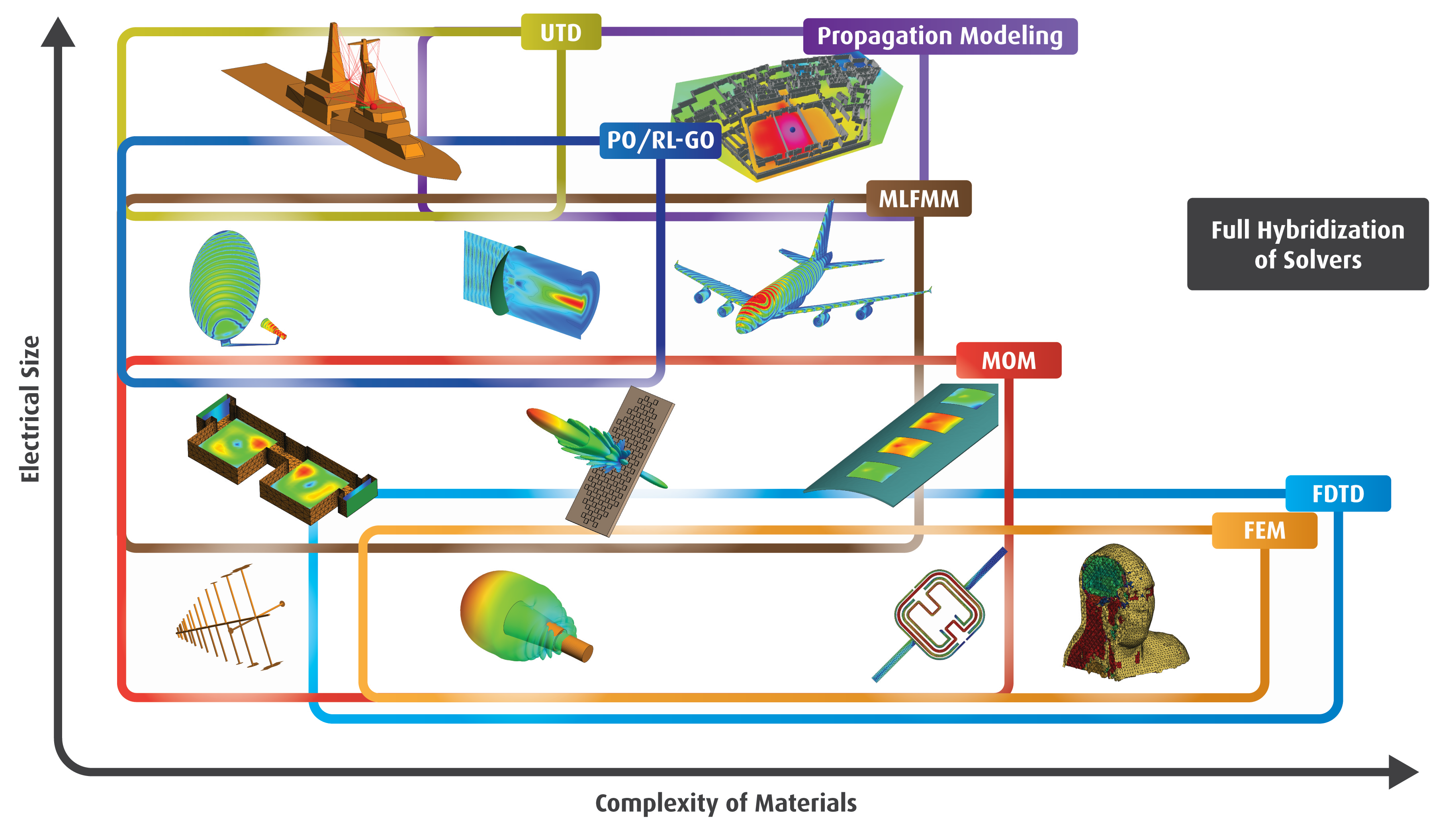Feko Overview
Feko is a comprehensive computational electromagnetics (CEM) software product used widely in the telecommunications, automotive, aerospace and defense industries.
The name Feko is an abbreviation derived from the German
phrase FEldberechnung bei Körpern mit beliebiger Oberfläche
(field computations
involving bodies of arbitrary shape). As the name suggests, Feko can be used for various types of electromagnetic field
analyses involving objects of arbitrary shapes. Feko offers
several frequency domain electromagnetic (EM) solution methods as well as a time domain
method under a single license. Hybridisation of these methods enables efficient analysis
of a broad spectrum of EM problems, including antennas, microstrip circuits, radio
frequency (RF) components and biomedical systems, the placement of antennas on
electrically large structures, the calculation of scattering (RCS), as well as the
investigation of electromagnetic compatibility (EMC).
Feko offers tools that are tailored to solve the more challenging EM interactions, including dedicated solvers for characteristic mode analysis (CMA) and bi-directional cables coupling. Special formulations are included for efficient simulation of integrated windscreen antennas and antenna arrays.

Solver Overview
- Full wave frequency domain solution methods:
- MoM (method of moments)
- FEM (finite element method)
- MLFMM (multilevel fast multipole method)
- Full wave time domain solution methods:
- FDTD (finite difference time domain)
- Asymptotic solution methods:
- PO (physical optics)
- LE-PO (large element physical optics)
- RL-GO (ray launching geometrical optics)
- UTD (uniform theory of diffraction)
CPU Parallelisation for Shared and Distributed Memory Systems
farmingparallelisation of simulation are two distinct concepts.
- With true distributed computing, any particular solution (for example, a single frequency) can be parallelised across multiple nodes. This is achieved via rigorous MPI-based parallelisation for clusters and shared memory computers. The efficiency of the parallelisation is improved by limiting the MPI interaction between processes.
- Farming assigns individual optimisation iterations to separate CPU cores, while not distributing the solution of the iterations.
- For multiple cores of a single CPU, OpenMP technology is used for parallelisation.
- For clusters or shared memory multi-CPU servers, select memory blocks are copied between processes. Communication is reduced and simulation time decreased, but a penalty is paid in terms of memory efficiency.
- In contrast, the cores of multi-core CPUs address the same memory block much faster than in shared memory multi-CPU systems. OpenMP parallelisation of Feko for multi-core CPUs make use of this fact to reduce memory requirements.
GPU Acceleration
Feko supports the use of multiple GPUs. It uses the GPU cores to accelerate simulation using the unified device architecture (CUDA) framework from NVIDIA. The computational phases targeted for execution on CUDA-based GPUs show a significant speedup when compared to standard CPU-based execution.
Optimisation
Feko offers state-of-the-art optimisation engines based on genetic algorithm (GA) and other methods, which can be used to automatically optimise the design and determine the optimum solution. Furthermore, for advanced design exploration, the interface to Altair HyperStudy offers a comprehensive post-processing functionality (including trade off analysis and stochastics).
User Interface
The Feko components with a graphical user interface (CADFEKO, EDITFEKO and POSTFEKO) make use of a ribbon driven interface that focusses on improved efficiency of workflow. CADFEKO supports parametric model construction. Complex geometry models and mesh models can be imported or exported in a wide range of industry standard formats. Use the application programming interface (API) to control CADFEKO or POSTFEKO from an external script or to automate repetitive and mundane tasks.
Updater
Feko has an updater utility that allows you the flexibility to install an update containing new features, minor software enhancements and bug fixes on top of an existing base installation.
Altair Units
Feko is part of the Altair Units based licensing system which allows metered usage of the entire Altair suite of products. This value-based licensing model has been extended to Altair's extensive partner network, providing the most comprehensive and dynamic set of solutions to the market.